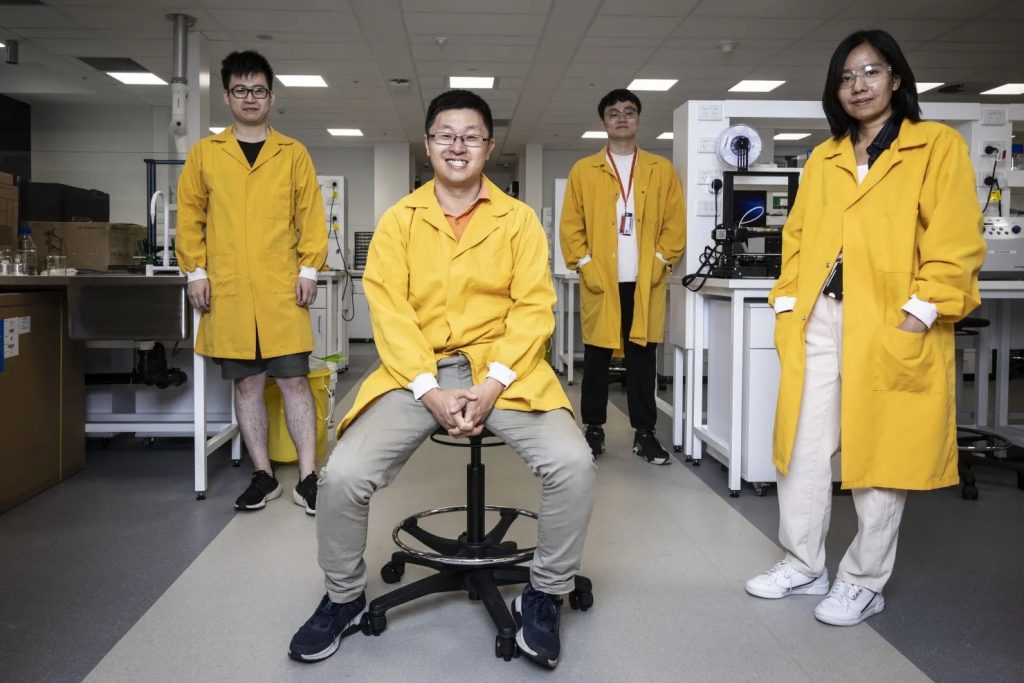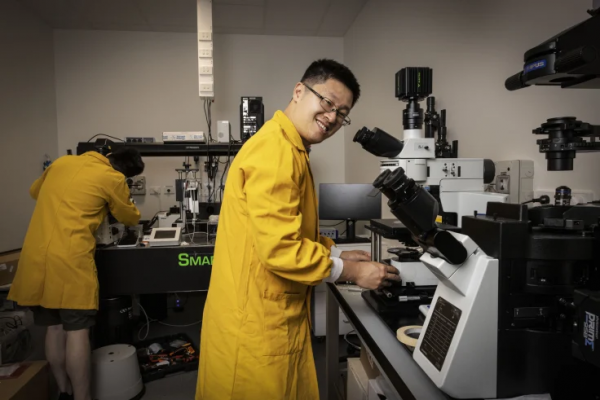New test to prevent heart attacks receives long-term funding boost
The Snow Medical Research Foundation has invested $8 million in rapid blood clot test microtechnology research, led by a Sydney biomedical engineer on a personal mission to save lives.
It was during the first year of his PhD that Associate Professor Arnold Lining Ju’s father suffered a heart attack at the age of 54 – his blood vessels occluded by clots. This “pivotal moment” not only drove home in the young engineer’s mind the critical effect of “the sheer force of blood flow” in the human body, it also altered his research career trajectory.
Inspired, he shifted his focus from mechanical to biomedical engineering. Now, he’s investigating cardiovascular mechanobiology and developing a rapid blood test microtechnology to predict clot risks and potentially prevent heart attacks for people like his father. “This personal connection has served as a constant reminder of the importance of early detection and intervention in cardiovascular diseases,” he says.

This year, Ju became the first engineer or physicist to receive an $8 million fellowship – $1 million per year for eight years – from the Snow Medical Research Foundation, in support of his research.
“Our fellowships are all about nurturing the research leaders of the next generation,” says Snow Medical Research Foundation chair, Tom Snow.
“We’re especially excited by cross-disciplinary collaboration, as seen in Arnold’s inspiring work, where engineering, physics and medical research come together so effectively.”
Affordable and accessible intervention
Ju’s novel blood test technology identifies mechanical changes in blood that signal clot formation, enabling quick intervention. The end goal, he explains, is a portable device featuring a 3D-printed vessel-mimicking biochip, which Ju anticipates could be realised in the next three to five years.
The test, which might look like the now-familiar rapid antigen tests (RAT) used to diagnose COVID-19 at home, could improve healthcare equality by offering an affordable and accessible means of identifying the need for early intervention for people in regional or remote areas who are at risk of heart attack or stroke.
“I hope my research will have a lasting impact by providing a simple and effective tool for early detection of blood clot risks, potentially preventing heart attacks and strokes,” says Ju.
Ju envisions the technology becoming even more accessible, affordable and widely used in the future. It could be adapted for other applications, such as monitoring blood coagulation in patients undergoing anticoagulant therapy, or assessing blood clotting risk in contexts such as heart attacks, strokes or deep vein thrombosis, he says.

Leveraging cutting-edge tech to save lives
Ju and his team have faced various challenges along their research and development journey, including making the technology small enough for practical use, ensuring accurate and dependable results, and keeping it affordable.
As a bioengineer, Ju’s multidisciplinary background has been instrumental in overcoming these hurdles – enabling him to tap into the latest progress in fields that include mechanobiology, biomanufacturing and point of care testing.
“My experience in engineering and physics has provided me with unique perspectives and problem-solving skills that have been invaluable in tackling the challenges of this project,” he says.
AI-powered diagnosis is also a key aspect of the personalised clot-detection vision, analysing complex data from blood samples and providing rapid, accurate results.
Distinguished fellows: diverse research, shared impact
Another recipient of a 2023 Snow Medical Fellowship is Dr Michelle Boyle of the Burnet Institute, who is working on developing vaccines and treatments for malaria. By studying the human immune system, Boyle’s team aims to identify and test new drugs to increase protection against malaria, a major killer of children under five globally.
Despite the varied focus areas of the two 2023 fellowship recipients, Ju and Boyle share a common goal: pushing the boundaries of medical research and making a real impact on patient care.
As well as the support from Snow Medical Research Foundation, Ju has received funding under the NSW Government’s Cardiovascular Research Capacity Program. This $150 million investment over 10 years funds high quality cardiovascular research within the state, with the aim of fostering scientific breakthroughs, advancing innovative treatment options and enhancing health outcomes for individuals with cardiovascular disease.
The combined support has enabled Ju’s biomedical engineering team to recruit top talent, invest in cutting-edge equipment and collaborate with leading researchers.
“The funding has been instrumental in advancing the emerging fields of bioengineering and mechanobiology, which have the potential to revolutionise healthcare and diagnostics, ultimately benefiting countless lives, both in Australia and around the world,” says Ju.
Updated 2 years ago